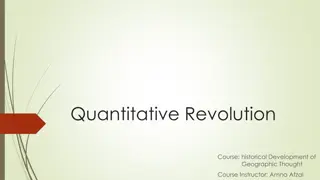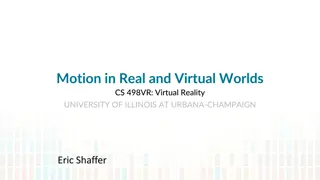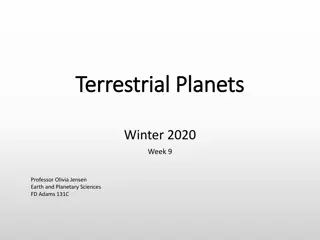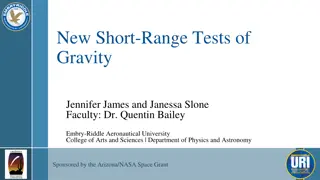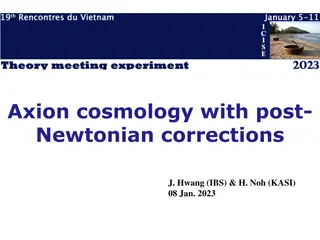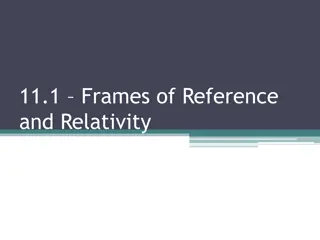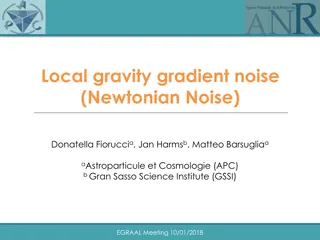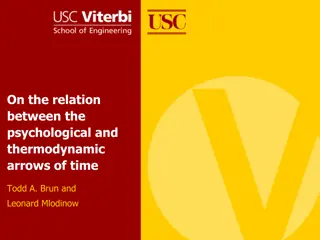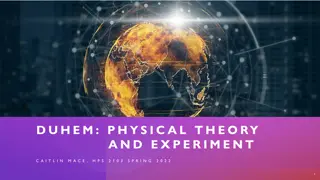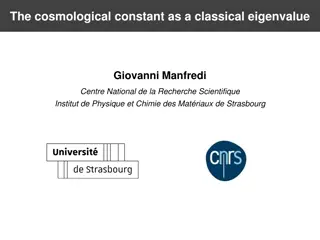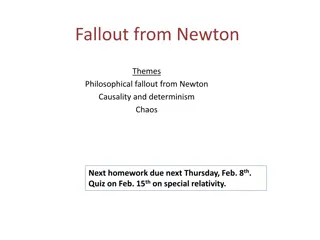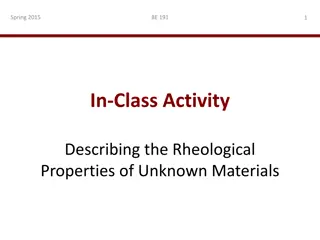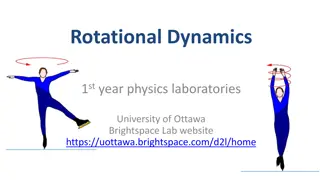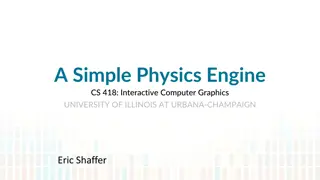Evolution of Geographic Thought: Quantitative Revolution
The Quantitative Revolution in Geography, led by Schaefer's critique of traditional views, propelled the shift towards a more objective and scientific approach. Embracing statistical and mathematical techniques, geographers sought regularities in spatial organization, marking a transition from areal
2 views • 11 slides
Motion in Real and Virtual Worlds
Explore the impact of physics on virtual reality experiences through mathematical modeling of motion in both real and virtual environments. Learn about tracking methods, human vestibular organs, numerical computations in 1D motion, acceleration, error estimation, Newtonian physics engines, mass and
1 views • 18 slides
Orbital Dynamics: Kepler's Laws and Newtonian Gravity
Delve into the fascinating world of orbital dynamics as we explore Kepler's Laws and Newtonian Gravity. From understanding the elliptical orbits of planets around the Sun to uncovering the role of gravity in shaping celestial motion, this journey will illuminate the fundamental principles governing
0 views • 18 slides
Mysteries of Cornstarch and Water Mixtures
Dive into the fascinating world of cornstarch and water mixtures with this engaging experiment. Discover the unique properties of this mysterious substance as it transitions between liquid and solid states based on external forces. Explore the science behind homogenous and heterogeneous mixtures, an
0 views • 20 slides
Short-Range Tests of Gravity: Theoretical Physics Project Overview
This project focuses on calculating modifications to the Newtonian gravitational force through experimental short-range tests of gravity. Utilizing the Standard-Model Extension (SME) test framework to search for potential violations of General Relativity and Newtonian Gravity. Key objectives include
1 views • 7 slides
Axion Cosmology with Post-Newtonian Corrections
Exploring axion cosmology with post-Newtonian corrections, this study delves into linear density perturbations for dust, the role of axion as a cold dark matter candidate, and fully nonlinear perturbation formulations. It addresses continuity, momentum conservation, and quantum stress to identify ke
0 views • 22 slides
Frames of Reference and Relativity
Explore the concept of frames of reference in physics, distinguishing between inertial and non-inertial frames. Learn about the laws of Newtonian mechanics, guidelines for inertial frames of reference, and delve into the intriguing realm of the Special Theory of Relativity with engaging visual aids
1 views • 35 slides
Newtonian Noise in Gravity Gradient Measurements
Investigating the impact of Newtonian Noise (NN) on various detectors and instruments used for measuring gravity gradients. The content delves into the frequency ranges affected by NN in detectors like LIGO, AdVirgo, and KAGRA, as well as the influence of infrasound and seismic waves. The discussion
1 views • 17 slides
Viscous Fluid Behavior in Engineering Applications
Viscosity is a crucial property in fluid mechanics, impacting how fluids deform and move. Engineers measure viscosity using factors like resistance to deformation and fluid behavior classifications such as Newtonian, shear thinning, shear thickening, and Bingham plastic. This knowledge is essential
1 views • 7 slides
Exploring the Relationship Between the Psychological and Thermodynamic Arrows of Time
Time, as a fundamental concept, exhibits a unidirectional flow from past to future, captured in both psychological and thermodynamic contexts. This article delves into the intriguing interplay between Newtonian dynamics and our intuitive perception of time's arrow, highlighting the challenges in rec
0 views • 28 slides
Experimental Testing of Physical Theories by Caitlin Mace - HPS 2103 Spring 2022
A detailed examination of the relationship between experimental testing and theoretical complexity in physics, exploring the limitations and implications of conducting experiments within the framework of complex theories. The content delves into the challenges faced by physicists in distinguishing b
1 views • 11 slides
The Cosmological Constant as a Classical Eigenvalue
The concept of the cosmological constant, its implications in the standard cosmological model, and its relation to dark energy are discussed in this scientific exploration. The discussion delves into whether the cosmological constant is truly constant or varies in space and time, and its role in gra
0 views • 10 slides
Newtonian Determinism and Philosophy: A Critical Examination
Within Newton's philosophical framework, the interplay between causality, determinism, and empiricism shapes his views on space, time, and the nature of reality. Examining his rules of reasoning and the implications of Newtonian determinism, we delve into the philosophical underpinnings of his scien
0 views • 16 slides
Rheology in Dental Materials
Rheology is a crucial aspect in dentistry as it deals with the flow properties of various dental materials, including liquids like molten alloy and impression materials. Viscosity plays a key role, determining how materials flow and behave. Different fluid classifications based on rheology, such as
2 views • 15 slides
Describing Rheological Properties of Unknown Materials - In-Class Activity (Spring 2015)
Explore the rheological properties of unknown materials in a hands-on in-class activity. Students work in teams to identify whether samples are pseudoplastic, Newtonian, or dilatant fluids based on viscosity changes with shear rate. Corn syrup, corn starch, icing, and toothpaste are analyzed, with f
0 views • 5 slides
Experimental Determination of Moment of Inertia in Rotational Dynamics Lab
In this university lab experiment, students apply known torques to various objects to measure angular accelerations and determine their moments of inertia. The setup involves rotating discs and rods with masses, using a rotational sensor for data collection. Important steps include measuring diamete
1 views • 12 slides
Solving Problems in Mechanics and Forces
This content presents various physics problems involving mechanics, forces, accelerations, and tensions. It covers scenarios such as objects on inclines, connected blocks with pulleys, elevator tensions, and frictionless surfaces. The problems require applying principles of Newtonian mechanics to de
0 views • 17 slides
Computational Chemistry Methods
The field of computational chemistry focuses on simulating chemical systems to provide detailed information at an atomic level. This involves two main methodological families: quantum chemical methods and molecular mechanics. Quantum chemistry methods explicitly consider electrons, while molecular m
0 views • 21 slides
The Foucault pendulum in Aggieland
Experience the wonder of the Foucault Pendulum in Aggieland, showcasing the principles of physics and modern theories. Explore the Special Theory of Relativity, Newtonian principles, inertial frames, and Galilean transformations. Delve into the fascinating world of physics with practical examples an
0 views • 39 slides
Rheology and Viscosity in Fluid Dynamics
Rheology explores Young's Modulus, Modulus of Rigidity, Bulk Modulus, and Poisson's Ratio. Viscosity delves into Newtonian and Non-Newtonian Fluids, dynamic and kinematic viscosity, and units of measurement.
0 views • 4 slides
Derivation for Non- Newtonian Flow and Numericals
Delve into the derivation of non-Newtonian fluid flow in a pipe, exploring the force balance, velocity profiles, and flow rate equations. Understand the influence of rheological parameters on fluid behavior through detailed derivations and numerical examples.
0 views • 11 slides
Exploring the Fascinating World of Modern Physics
Dive into the realm of modern physics, encompassing the revolutionary theories of relativity and quantum mechanics. Discover the evolution from classical physics to the specialized fields like mechanics, thermal physics, wave motion, electricity, and more. Uncover the significance of Newtonian mecha
0 views • 12 slides
Understanding Viscosity in Colloidal Systems
Explore the concept of viscosity and its importance in studying colloidal systems. Learn about Newtonian and Non-Newtonian fluids, viscosity coefficients, Einstein's equation, and how viscosity data can reveal molecular weights. Discover the significance of intrinsic viscosity and its role in calcul
0 views • 16 slides
Analytical Mechanics Course Outline and References
Explore the syllabus, course description, outline, and references for Analytical Mechanics covering topics like Newtonian mechanics, Lagrangian mechanics, Hamiltonian dynamics, and more. Dive deep into advanced mathematical concepts to understand the dynamics of particles and rigid bodies in various
0 views • 7 slides
Simple Physics Engine for Interactive Computer Graphics
Learn how to create an interactive physics engine for computer graphics, covering topics such as Newtonian physics, forces, acceleration, gravity, and drag. Understand the fundamentals of integrating to compute position and velocity while animating particles in a simulated environment.
0 views • 15 slides
